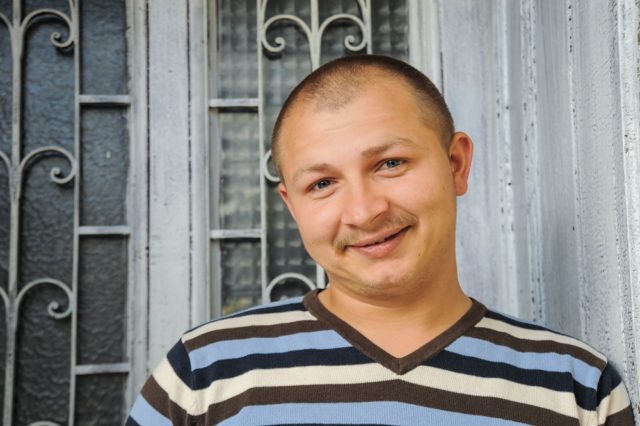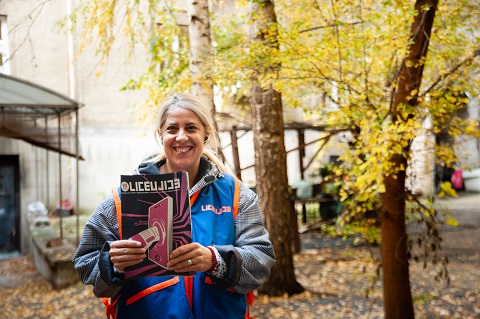By Anja Sinadinović, Liceulice
For years I bought Liceulice from Mirko, in front of the Philosophy Faculty, until one day he vanished from the streets. I recently joined the Liceulice team as a volunteer, and the next time I saw him (two years later) was when he showed up at our office, a shy smile on his face. He was holding a printed copy of a Toše Proeski [a Macedonian musician] song in English, which he’d brought us as a gift. When it comes to Mirko, this gesture of appreciation was nothing out of the ordinary but rather something that comes naturally to him.
When we saw each other again, the first question I had for him was about the period between our last meeting at Plateau and this recent meeting at the office. Reluctant to go into details, as is always the case when the subject of discussion is unpleasant, he revealed to me only that when he had stopped selling our magazine, he had started selling greeting cards – a job he had left, disappointed. For some time afterward, he had worked in other ex-Yugoslavia countries and that before returning to Belgrade he had spent the last few months working in the village, helping his father and their large family.

After returning, it didn’t take long for him to confirm his place among our best sellers. On his first day back, he had already sold forty copies, which, though a lot, was only slightly more than his daily minimum of thirty sold copies, which is the amount that he has to sell before going home. When I asked him what his secret was, his face immediately broke into a smile. His modest response was that all you need to do is to be well-behaved and polite towards others, pay them a compliment if given the opportunity and that it is important others feel your positivity. Or, in his own words – if you feel bored, your customers don’t need to know that you’re bored.
Although he doesn’t mention them, I know of a few of his other characteristics which have resulted in his success. These are incredible diligence, conscientiousness, and perseverance. These are probably a consequence of the fact that from the time he was twelve, Mirko was forced to beg at Kalemegdan, pretending to be both deaf and dumb. This allowed some of his twelve siblings to go to school, while he himself never made it past the sixth grade of primary school. Even when he recalls this dark patch in his past, he tries to focus his attention on the good times. “I enjoyed the fact that those people who gave me money understood to some degree what I was going through and they wanted to make me laugh.” He came to the Drop In Centre from the streets, and there he made friends with whom he is still in contact and who mean so much to him that he carries their photos in his wallet.
In some of these photos is a guy with big eyes and an unusual hairdo, which is why he’s hard to miss. This is Emir, with whom Mirko now works in tandem, each day at Plateau or at Republic Square, selling our magazine. The two met many years ago, while Mirko was still begging in the streets, at the same location that they now sell Liceulice in. Emir had jumped to his defense when he had been attacked some guys who had wanted to steal his money, and Mirko says that right then and there he realised that Emir had a pure heart. This opinion was only strengthened when Emir and his family had taken Mirko in after being kicked out of his own home. Now Mirko wants to help him, as he says, “to keep him on the straight and narrow.” And he is doing this every day at Plateau while selling Liceulice, by teaching Emir to become a better salesperson and to fight to keep his willpower, even when he feels like quitting.
These two are not only a business duo; they have recently begun living together. Finding a flat is never easy, but when you live on the edge of society, this, like many other things, is practically a mission impossible. During this difficult period, Mirko made two new friends, brothers, Bojan and Goran, who are the owners of a hostel called Capital. They allowed them to sleep and eat at the hostel for free, and our boys return the favour by helping them clean the hostel every day for its other guests. Mirko says that they have given him new hope that humanity is not entirely lost and he thinks that others should follow their lead.
We begin to discuss what it was that allowed them to rent a flat, i.e. selling Liceulice Magazine. Mirko said to me, “I like the fact that in front of the faculty, I have a lot of acquaintances and friends who understand what I want to say to them but can’t. Maybe they see this. My favourite thing in the world is when people want to stop and talk to me and hear what a child who has lived and worked on the streets has to say. This is the best part of my day when I am out selling Liceulice.” His most unpleasant experiences are the exact opposite, when he sees that he is being rejected or judged because of the fact that he has lived and worked in the streets. However, Mirko does not dwell on the negative but continues to tell me about all the things he likes to do.
One of these things is cooking. He is thankful to his grandmother for his culinary skills, who had started teaching him how to cook and prepare food at a very young age, as, he has two sisters who were never interested in cooking and therefore this role fell on him. With much fervor, he tells me about his favourite homemade bread with olives, baked under hot tiles. With no less enthusiasm, he talks about Snickers cake, coconut cake, cabbage rolls and, basically all other foods.
However, his greatest passion is not cooking, but taking photos. Two years ago, he had passed a photo workshop called The Eye of the Streets, owned by Dragan Kujundžić and Željko Šafar. When he started attending classes, he had no idea that he “had an eye for taking photographs.” The first two days he didn’t like any of it, then all of a sudden he realised that he was looking at the city from a new angle, “through the eyes of a true photographer”. He realised that he was able to take photos of objects that he found to be beautiful so that they were interesting to others as well, and that each photo “is worth a thousand words.” He now dreams of finishing primary school, and to then attend a photography school. “It would fill my heart if I could take photos for newspapers. I would take a day or two off from work, just to take photos,” says Mirko, full of innocent optimism. Despite the fact that he doesn’t own a camera yet, Mirko daydreams of being able to once again exhibit his photos, independently, this time. Until then, his photos can be viewed on Facebook at Mirko Ondrik Fotograf.
To conclude, I would like to describe the situation that took place after our interview. On his way home from work, Mirko found an abandoned puppy next to a bin in his new neighbourhood, and without thinking, took it home to care for together with Emir. That evening he called me, angry with the people who had rejected the puppy but also feeling compassion. He said to me, “Teacher, the small dog snores like a man.”
Translated from Serbian by Dragana Kragulj / Translators Without Borders




















